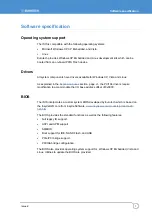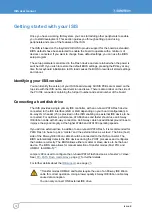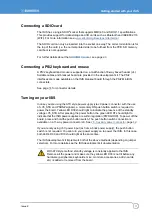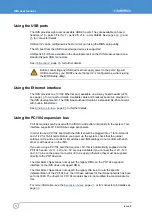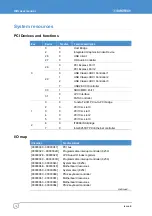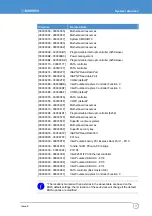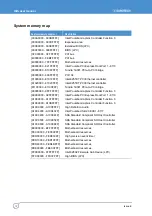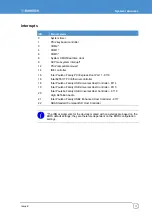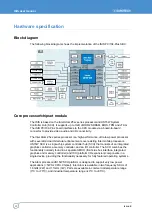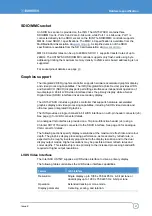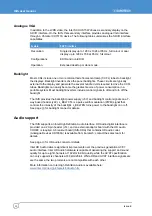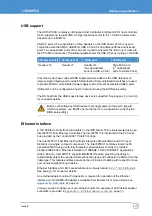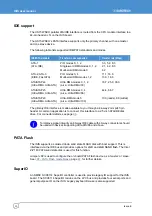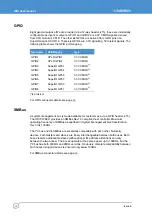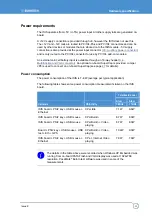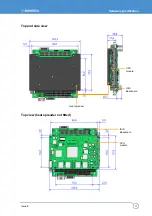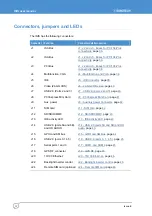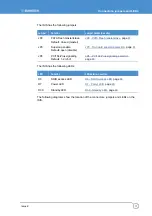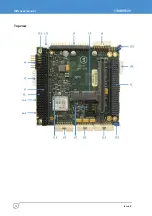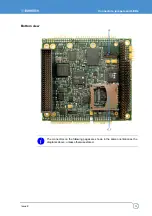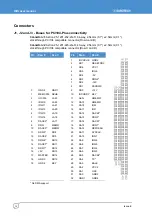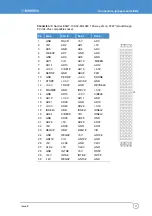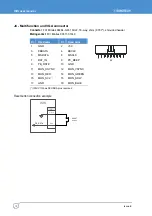
Hardware specification
Issue E
23
SDIO/MMC socket
An SDIO bus socket is provided on the ISIS. The US15W SCH contains three
SDIO/MMC ports. Ports 0 and 2 are 8-bits wide, while Port 1 is 4 bits wide. Port 1 is
connected directly to the SDIO socket on the ISIS.The SDIO/MMC controller supports
MMC4.0 and SDIO1.1 specifications. The MMC 4.0 specification is available from the
MulitMediaCard Association at
. A simplified version of the SDIO
specification is available from the SD Card Association at
MMC 4.0 transfer rates can be up to 48MHz; SDIO 1.1 supports transfer rates of up to
24MHz. The US15W SCH SDIO/MMC controller supports only flash cards using byte
addressing limiting the maximum memory density to 2GB; sector based addressing is not
supported.
For socket pinout details, see page
.
Graphics support
The integrated 2D/3D graphics controller supports hardware accelerated graphics display
and video processing capabilities. The IGD (Integrated Graphics Device) provides LVDS
and Serial DVO (SDVO) display ports permitting simultaneous independent operation of
two displays. A 24-bit LVDS video interface drives the primary display, while a Serial
Digital Video (SDVO) interface drives a secondary display.
The US15W SCH includes a graphics controller that supports hardware accelerated
graphics display and video processing capabilities, including full HD video decode and
ultra low power integrated 3D graphics.
The ISIS provides a single channel 24-bit LVDS interface on a 20-pin header connector (J6).
See page
for LVDS connector details.
An analogue VGA interface is provided on a 18-pin multifunction header (J4) using a
Chrontel CH7317A device connected to the SDVO interface. See page
for analogue
VGA connector details.
The following sections specify display resolutions at the maximum refresh rate and colour
depth. The graphics display processing performance, as measured by refresh rate, is
expected to be roughly inversely proportional to the display resolution and to the dual
display output modes. Higher resolutions may be possible at lower refresh rates and
colour depths. This relationship is due primarily to the increased processing bandwidth
required at higher output resolutions.
LVDS Video Interface
The Intel SCH US15W supplies a LVDS video interface to drive a primary display.
The following table summarises the LVDS video interface capabilities.
Feature
LVDS Interface
Resolution
Single display up to 1366 x 768 at 85 Hz, 8-bit per lane or
dual display up to 1280 x 768 at 85 Hz, 8-bit per lane.
Operation
Extended desktop or clone mode.
Display parameter
Centering, scaling, and rotation.

